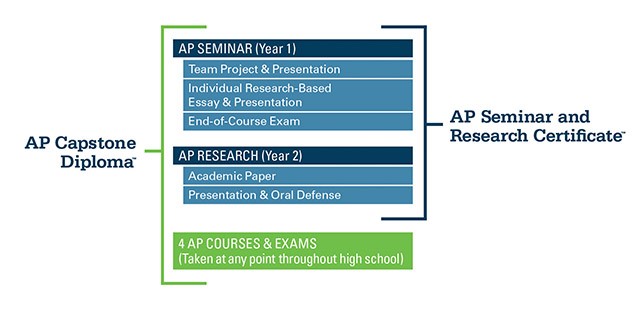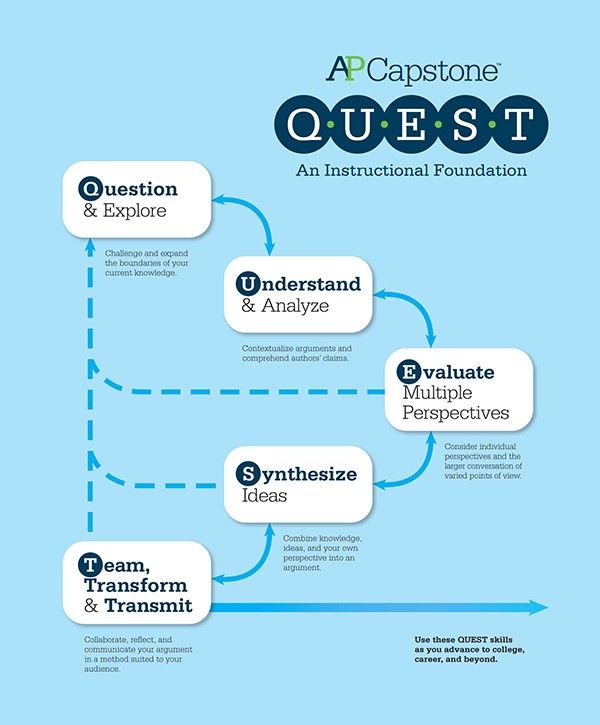AP Capstone
AP Capstone
AP Capstone brochure
AP Seminar Slide Presentation
“Anyways, I wanted to thank you for creating such a stimulating environment in AP Seminar. It’s probably the most useful class I took in high school, especially for all my 10+ page essays this semester. Critical thinking, crafting an argument, and navigating databases are all skills I learned in your class. I remember coffee, discussions about cannibalism, and team-building activities bright and early at 6:30 AM. Thanks for helping me make these lovely memories of high school!“
-Fizzah Arshad
ORH Class of ‘2020
Princeton University student
“Capstone and especially AP Research gave me the opportunity to pursue my interests in research and cosmetics. Without it, I never would’ve conducted my research experiment at UCSD and only have a vague idea of the path I want to follow. Being a pioneer student of the program was definitely one of the most challenging and rewarding experience of my high school career, and I recommend other students to take the course!“
-Freya Medina
ORH Class of ‘2020
UC Berkeley student
“AP Capstone is the single most valuable program any student at Otay could participate in. I learned so much in Capstone beyond the curriculum, like time management, collaboration, and self-motivation. I can confidently say that my research is what set me apart during college applications, not just because I had written a large essay or completed a long presentation, but because I had articulable evidence that I was passionate about a subject and was ready to pursue it in depth.”
-Jayda Alvarez
ORH Class of ’20
Stanford University student
How AP Capstone Works
Students typically take AP Seminar in grade 10 or 11, followed by AP Research. Students who earn scores of 3 or higher in AP Seminar and AP Research and on four additional AP Exams of their choosing receive the AP Capstone Diploma™. Students who earn scores of 3 or higher in AP Seminar and AP Research but not on four additional AP Exams receive the AP Seminar and Research Certificate™.

The QUEST Framework
In the AP Capstone™ program, students consider and evaluate multiple points of view to develop their own perspectives on complex issues and topics through inquiry and investigation.
AP Capstone gives students the following pedagogical framework (“QUEST”) to develop, practice, and hone their critical and creative thinking skills as they make connections between various issues and their own lives:
- Question and Explore
Questioning begins with an initial exploration of complex topics or issues. Perspectives and questions emerge that spark one’s curiosity, leading to an investigation that challenges and expands the boundaries of one’s current knowledge. - Understand and Analyze Arguments
Understanding various perspectives requires contextualizing arguments and evaluating the authors’ claims and lines of reasoning. - Evaluate Multiple Perspectives
Evaluating an issue involves considering and evaluating multiple perspectives, both individually and in comparison to one another. - Synthesize Ideas
Synthesizing others’ ideas with one’s own may lead to new understandings and is the foundation of a well-reasoned argument that conveys one’s perspective. - Team, Transform, and Transmit
Teaming allows one to combine personal strengths and talents with those of others to reach a common goal. Transformation and growth occur upon thoughtful reflection. Transmitting requires the adaptation of one’s message based on audience and context.

AP Seminar
In this yearlong course, students develop and strengthen analytic and inquiry skills, exploring two to four relevant issues chosen by the student and/or teacher. For example, students might explore the question of whether national security is more important than a citizen’s right to privacy, or whether genetic engineering is a benefit to society.
Using an inquiry framework, students practice reading and analyzing articles; research studies; foundational, literary, and philosophical texts; listening to and viewing speeches, broadcasts, and personal accounts; and experiencing artistic works and performances. Students learn to consider an issue from multiple perspectives, evaluate the strength of an argument, and make logical, fact-based decisions. Students question, research, explore, pose solutions, develop arguments, collaborate, and communicate using various media. After taking AP Seminar, students will have the opportunity to further hone their inquiry and analytical writing skills in AP Research.
AP Seminar Assessment
AP Seminar students are assessed with two through-course performance tasks and one end-of-course exam. The performance tasks consist of a team project and presentation, and an individual research-based essay and presentation. All three assessments are summative and are used to calculate a final AP score of 1 to 5.
The two through-course performance tasks for AP Seminar are teacher-scored. The end-of-course exam is in May; it takes two hours and consists of three short-answer questions and one essay question.
AP Research
AP Seminar is a prerequisite for AP Research.
AP Research allows students to design, plan, and conduct a yearlong research-based investigation on a topic of individual interest, documenting their process with a portfolio. This allows students to demonstrate the ability to apply scholarly understanding to real-world problems and issues.
Students further the skills developed in AP Seminar by learning how to understand research methodology, employ ethical research practices, and access, analyze, and synthesize information to build, present, and defend an argument. Students may choose to do one of the following:
- Dig deeper into a topic studied in an AP course.
- Work across academic areas with an interdisciplinary topic.
- Study a new area of interest, perhaps one for further study at the college level.
AP Research Assessment
The AP Research course culminates in an academic paper of 4,000 to 5,000 words and a presentation with an oral defense. The two components of the through-course performance task are teacher-scored, and the academic paper is validated by the College Board after being scored. There is no end-of-course exam for AP Research.
For the oral defense, AP Research teachers should choose two additional adult panel members — expert advisers or discipline-specific experts. Both components are included in the calculation of a final AP score (using the 1–5 scale).
